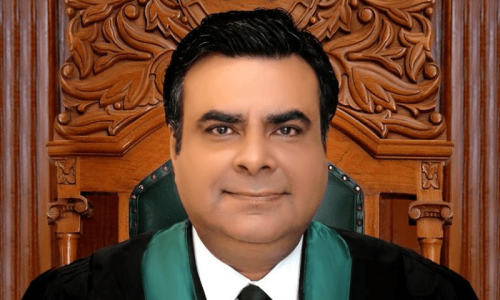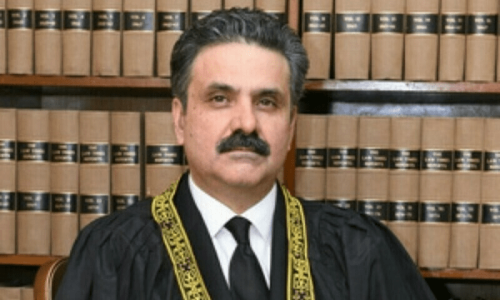WASHINGTON, Feb 4: Although the Bush administration has concerns about political continuity in a post-Musharraf Pakistan, it is not interested in rocking the boat at this time, says a political commentary by a Washington think-tank while explaining why former Prime Minister Benazir Bhutto did not get to see President George W. Bush at a prayer breakfast last week.
According to Stratfor, the US administration feels that while Gen Pervez Musharraf's domestic position remains vulnerable “he is not terribly unpopular.”
Had the People’s Party Parliamenta-rains succeeded in creating significant domestic turmoil for President Musharraf, hindering his ability to govern the country, then Washington's position would be much different. In that case, though perhaps not President Bush himself, others in his administration would have met Ms Bhutto and other PPP leaders.
The analyst feels that the PPP would have liked to use such a meeting to try to convince President Bush to pressure President Musharraf with regard to the next round of parliamentary elections in late 2007 or early 2008. The PPP, concerned about the fairness of the elections, believed it could have gotten support from Mr Bush in this regard.
The PPP also could have used the political mileage from a meeting with Mr Bush to enhance its domestic position and, thus, to generate momentum against the Musharraf government.
The analyst notes that the PPP has been unable to generate a popular movement against Musharraf for a number of reasons. First, Ms Bhutto has been living in exile for the past decade. Second, Musharraf has been able to weaken the party by engineering defections. Third, the government has created rifts between the PPP and its main ally, the Pakistan Muslim League-Nawaz, and thus prevented the creation of a coherent opposition alliance.
The analyst points out that President Musharraf has sown mistrust between the government's two principal opponents by leaking information that officials were engaged in back-channel talks with the PPP about a possible power-sharing deal. Islamabad also adroitly used the recently passed Protection of Women bill to further add to the impression that there would be an accommodation between the PPP and Gen Musharraf.
The government knew the pro-women measure would get PPP support whenever it came up for debate, but timed the vote on it for shortly after the PPP and the PML-N (which opposes anything that even hints at cooperation with the government) embarked on a joint programme against President Musharraf.
By forcing the PPP to vote for the measure, Gen Musharraf managed to get the PML-N to question the viability of cooperation with the PPP. At the same time, he also prevented the religious bloc, which opposes any liberal reform, from aligning with the two mainstream parties.
The analyst notes that there has been much speculation on all sides regarding the PPP’s possible course of action against President Musharraf — and even on whether it actually can do anything to oust him, given its weakened state and absent leader. Senior PPP-P leaders recently told Stratfor, however, that Ms Bhutto would return to Pakistan once the government announces an election schedule.
One top leader, however, acknowledged that the party would find it impossible to launch a popular movement against the Musharraf government before the elections, though he said a movement could emerge from an enraged public should the elections be rigged.
Analysing the current political situation in Pakistan, the think-tank observers that the PPP, now out of power for more than a decade, has been forced not only to participate in the elections held by the government but also to consider negotiating with the military government. Its leaders, however, remain adamant that any deal with the government would take place only if it included a power-sharing arrangement.
One PPP leader even suggested that the party could join its ideological rival — religious alliance, the Mutahidda Majlis-i-Amal — in a mass movement to topple the Musharraf government.
Domestically, the PPP has no good choices. It has been unable to work out a deal with Gen Musharraf that does not include de-legitimising itself, and it faces significant hurdles to forging a grand alliance with other anti-Musharraf forces. For now, the PPP’s position allows President Musharraf the bandwidth to better manage his hold on power, especially regarding the coming elections. It also puts him in a strong position to experiment with bargaining with the PPP. Senior leaders from the ruling Pakistan Muslim League, however, have expressed their discomfort regarding the moves to cut a deal with the PPP.















































Dear visitor, the comments section is undergoing an overhaul and will return soon.